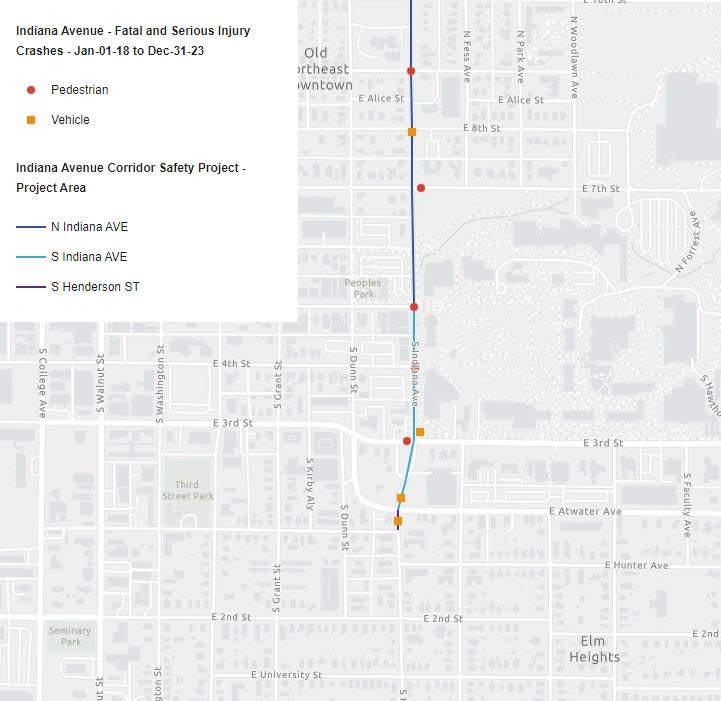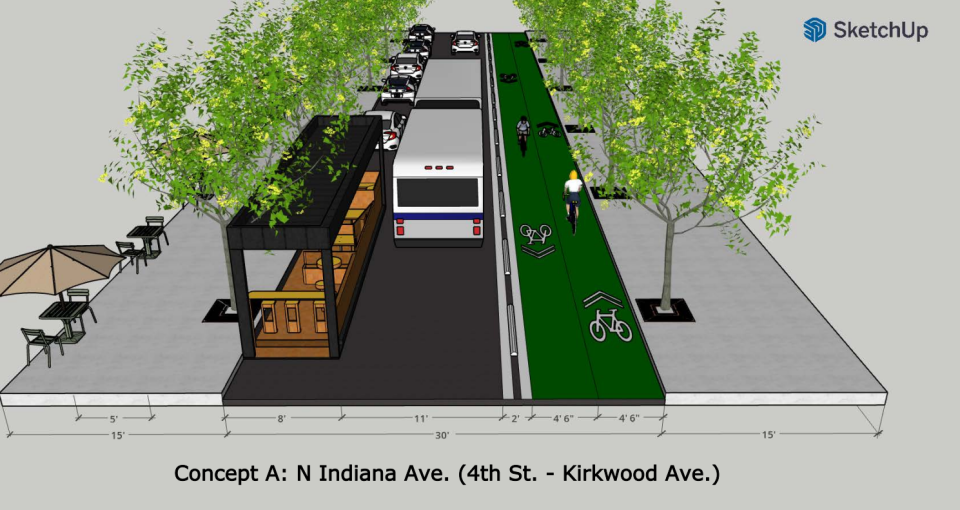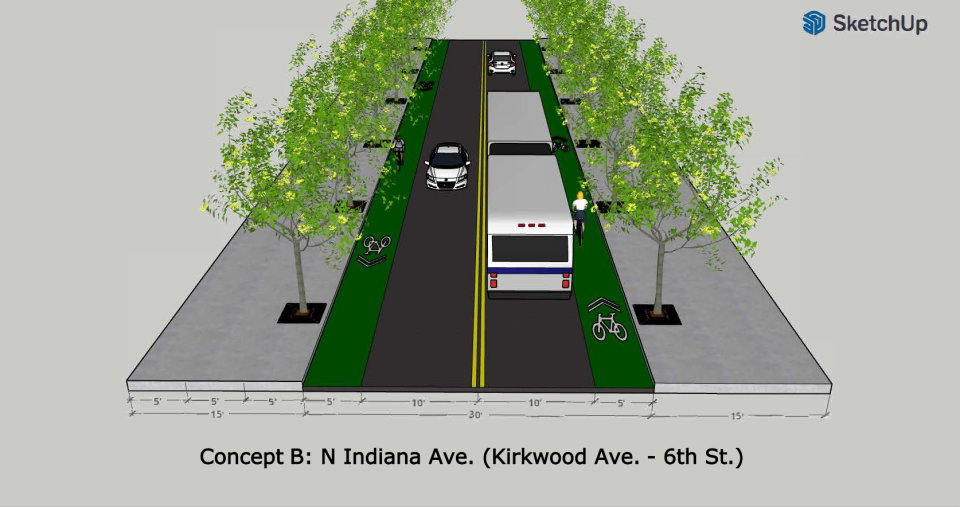Bloomington weighs proposals to improve one of the “most dangerous areas in the city”
Indiana Avenue, which divides Indiana University from downtown Bloomington and currently operates as a northbound one-way from Atwater Avenue to 10th Street, is one of the “most dangerous areas in the city” for pedestrian and traffic accidents, according to Bloomington bicycle and pedestrian coordinator Hank Duncan.
The city recently unveiled two concepts to improve safety on Indiana Avenue: either convert one lane into a protected bike lane or convert the road from East Atwater Avenue through East 10th Street into a two-way street.
“This is one of, if not the most, popular pedestrian destinations, but we know that there is discomfort happening here,” Duncan said. “There are injuries and fatalities that are happening on this corridor.”
City employees identified the Indiana Avenue corridor for improvement after completing an interactive map of where the most pedestrian and traffic fatalities or serious injuries occurred. Between 2018 and 2023, the Indiana Avenue corridor had nine serious injuries or fatalities, the majority in the area adjacent to IU.

The city sought input from the community about improving Indiana Avenue, hearing from about 250 people.
“It’s not asking, ‘Is this corridor fine?’ – we know it’s not,” Duncan said. “The goal is to create a safer, more relaxed pedestrian environment.”
The city hopes to start making changes to Indiana Avenue in 2025. A meeting for public feedback will be 5:30 p.m. Aug 13 at the Sample Gates.
‘Concept A’: two-way, protected bike lane on Indiana Avenue
One possibility is to convert the right lane into a protected, two-way bicycle lane, similar to the one the city built on Seventh Street.

Concept A would maintain one lane for vehicles from Atwater Avenue to 10th Street and add raised crosswalks (speed humps with crosswalks on them) at Sixth, Eighth and Ninth streets.
The two-way bike lane would be separated from vehicle traffic by low, plastic barriers like those on East Third Street between Mitchell Street and Atwater Avenue.

Duncan said adding a protected bicycle lane and reducing vehicle traffic to one lane would result in lower speeds and more safety for pedestrians.
He said the city slightly prefers this proposal to the two-lane "concept B," as it reduces the number of vehicle lanes pedestrians and bikers need to navigate.
‘Concept B’ proposes turning Indiana Avenue into two-way street

The second concept, which Duncan said was largely inspired by public feedback, would convert the Indiana Avenue corridor into a two-way street with north and southbound traffic and an unprotected bike lane on each side.

Concept B would also add raised crosswalks at Sixth, Eight and Ninth streets.
Duncan said the addition of an opposing traffic lane would encourage drivers to slow down at pedestrian crosswalks, especially those connecting Kirkwood Avenue to IU.
Early feedback raises concern about pedestrian safety, parking for businesses, traffic congestion
During a July 16 public meeting on the corridor proposals, Duncan said the city was working with businesses facing Indiana Avenue, like Dagwoods and BuffaLouie’s, to try to maintain parking spaces and their outdoor patios.
“I'm still communicating with the businesses to ensure that we can allocate that space to what their needs are, if they need that space at all,” Duncan said. “Something in that space will change; it just depends on what you all say and what the businesses say.”Attendees raised concerns that concept B would make pedestrian crossings more difficult as people would have to look for traffic in both directions. Duncan said that’s one of the reasons the city prefers concept A.
“The best way to create a safer pedestrian environment is to slow down traffic and remove lanes,” Duncan said. “We want to create a safer, more relaxed environment, and because of that, we are proposing removing a lane of traffic.”Duncan said early conversations with both Bloomington Transit and IU Campus Bus Service didn’t raise any major concerns about reducing vehicle traffic to one lane increasing congestion.
Duncan said public feedback is vital in continuing conversations on improving the Indiana Avenue corridor. He encourages residents to provide feedback on the two proposals via an online survey form at bloomington.in.gov/engineering/projects/indiana, and the August public meeting.
“We’re not making the street for us, we’re making it for the community,” Duncan said. “In doing that, we have to get community feedback.”
Reach Brian Rosenzweig at brian@heraldt.com. Follow him on Twitter/X at @brianwritesnews.
This article originally appeared on The Herald-Times: Bloomington considers making Indiana Avenue one lane or two way

